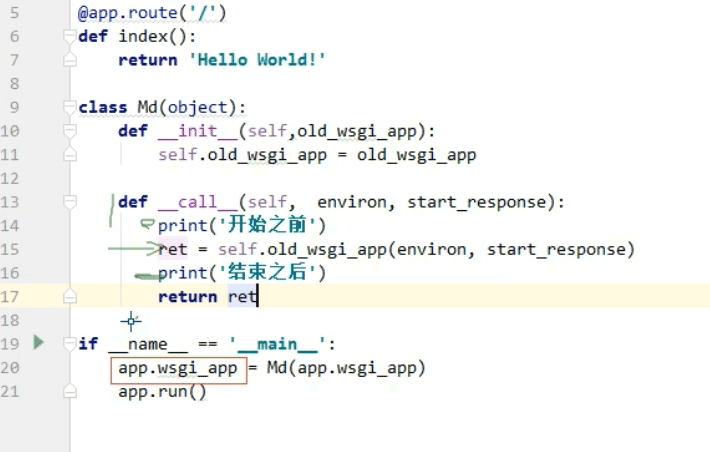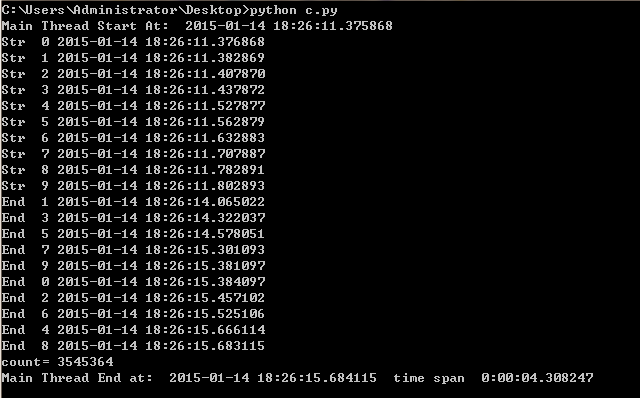python继承和抽象类的实现方法
本文实例讲述了python继承和抽象类的实现方法。分享给大家供大家参考。
具体实现方法如下:
复制代码 代码如下:
#!/usr/local/bin/python
# Fig 9.9: fig09_09.py
# Creating a class hierarchy with an abstract base class.
class Employee:
"""Abstract base class Employee"""
def __init__(self, first, last):
"""Employee constructor, takes first name and last name.
NOTE: Cannot create object of class Employee."""
if self.__class__ == Employee:
raise NotImplementedError, \
"Cannot create object of class Employee"
self.firstName = first
self.lastName = last
def __str__(self):
"""String representation of Employee"""
return "%s %s" % (self.firstName, self.lastName)
def _checkPositive(self, value):
"""Utility method to ensure a value is positive"""
if value < 0:
raise ValueError, \
"Attribute value (%s) must be positive" % value
else:
return value
def earnings(self):
"""Abstract method; derived classes must override"""
raise NotImplementedError, "Cannot call abstract method"
class Boss(Employee):
"""Boss class, inherits from Employee"""
def __init__(self, first, last, salary):
"""Boss constructor, takes first and last names and salary"""
Employee.__init__(self, first, last)
self.weeklySalary = self._checkPositive(float(salary))
def earnings(self):
"""Compute the Boss's pay"""
return self.weeklySalary
def __str__(self):
"""String representation of Boss"""
return "%17s: %s" % ("Boss", Employee.__str__(self))
class CommissionWorker(Employee):
"""CommissionWorker class, inherits from Employee"""
def __init__(self, first, last, salary, commission, quantity):
"""CommissionWorker constructor, takes first and last names,
salary, commission and quantity"""
Employee.__init__(self, first, last)
self.salary = self._checkPositive(float(salary))
self.commission = self._checkPositive(float(commission))
self.quantity = self._checkPositive(quantity)
def earnings(self):
"""Compute the CommissionWorker's pay"""
return self.salary + self.commission * self.quantity
def __str__(self):
"""String representation of CommissionWorker"""
return "%17s: %s" % ("Commission Worker",
Employee.__str__(self))
class PieceWorker(Employee):
"""PieceWorker class, inherits from Employee"""
def __init__(self, first, last, wage, quantity):
"""PieceWorker constructor, takes first and last names, wage
per piece and quantity"""
Employee.__init__(self, first, last)
self.wagePerPiece = self._checkPositive(float(wage))
self.quantity = self._checkPositive(quantity)
def earnings(self):
"""Compute PieceWorker's pay"""
return self.quantity * self.wagePerPiece
def __str__(self):
"""String representation of PieceWorker"""
return "%17s: %s" % ("Piece Worker",
Employee.__str__(self))
class HourlyWorker(Employee):
"""HourlyWorker class, inherits from Employee"""
def __init__(self, first, last, wage, hours):
"""HourlyWorker constructor, takes first and last names,
wage per hour and hours worked"""
Employee.__init__(self, first, last)
self.wage = self._checkPositive(float(wage))
self.hours = self._checkPositive(float(hours))
def earnings(self):
"""Compute HourlyWorker's pay"""
if self.hours <= 40:
return self.wage * self.hours
else:
return 40 * self.wage + (self.hours - 40) * \
self.wage * 1.5
def __str__(self):
"""String representation of HourlyWorker"""
return "%17s: %s" % ("Hourly Worker",
Employee.__str__(self))
# main program
# create list of Employees
employees = [ Boss("John", "Smith", 800.00),
CommissionWorker("Sue", "Jones", 200.0, 3.0, 150),
PieceWorker("Bob", "Lewis", 2.5, 200),
HourlyWorker("Karen", "Price", 13.75, 40) ]
# print Employee and compute earnings
for employee in employees:
print "%s earned $%.2f" % (employee, employee.earnings())
# Fig 9.9: fig09_09.py
# Creating a class hierarchy with an abstract base class.
class Employee:
"""Abstract base class Employee"""
def __init__(self, first, last):
"""Employee constructor, takes first name and last name.
NOTE: Cannot create object of class Employee."""
if self.__class__ == Employee:
raise NotImplementedError, \
"Cannot create object of class Employee"
self.firstName = first
self.lastName = last
def __str__(self):
"""String representation of Employee"""
return "%s %s" % (self.firstName, self.lastName)
def _checkPositive(self, value):
"""Utility method to ensure a value is positive"""
if value < 0:
raise ValueError, \
"Attribute value (%s) must be positive" % value
else:
return value
def earnings(self):
"""Abstract method; derived classes must override"""
raise NotImplementedError, "Cannot call abstract method"
class Boss(Employee):
"""Boss class, inherits from Employee"""
def __init__(self, first, last, salary):
"""Boss constructor, takes first and last names and salary"""
Employee.__init__(self, first, last)
self.weeklySalary = self._checkPositive(float(salary))
def earnings(self):
"""Compute the Boss's pay"""
return self.weeklySalary
def __str__(self):
"""String representation of Boss"""
return "%17s: %s" % ("Boss", Employee.__str__(self))
class CommissionWorker(Employee):
"""CommissionWorker class, inherits from Employee"""
def __init__(self, first, last, salary, commission, quantity):
"""CommissionWorker constructor, takes first and last names,
salary, commission and quantity"""
Employee.__init__(self, first, last)
self.salary = self._checkPositive(float(salary))
self.commission = self._checkPositive(float(commission))
self.quantity = self._checkPositive(quantity)
def earnings(self):
"""Compute the CommissionWorker's pay"""
return self.salary + self.commission * self.quantity
def __str__(self):
"""String representation of CommissionWorker"""
return "%17s: %s" % ("Commission Worker",
Employee.__str__(self))
class PieceWorker(Employee):
"""PieceWorker class, inherits from Employee"""
def __init__(self, first, last, wage, quantity):
"""PieceWorker constructor, takes first and last names, wage
per piece and quantity"""
Employee.__init__(self, first, last)
self.wagePerPiece = self._checkPositive(float(wage))
self.quantity = self._checkPositive(quantity)
def earnings(self):
"""Compute PieceWorker's pay"""
return self.quantity * self.wagePerPiece
def __str__(self):
"""String representation of PieceWorker"""
return "%17s: %s" % ("Piece Worker",
Employee.__str__(self))
class HourlyWorker(Employee):
"""HourlyWorker class, inherits from Employee"""
def __init__(self, first, last, wage, hours):
"""HourlyWorker constructor, takes first and last names,
wage per hour and hours worked"""
Employee.__init__(self, first, last)
self.wage = self._checkPositive(float(wage))
self.hours = self._checkPositive(float(hours))
def earnings(self):
"""Compute HourlyWorker's pay"""
if self.hours <= 40:
return self.wage * self.hours
else:
return 40 * self.wage + (self.hours - 40) * \
self.wage * 1.5
def __str__(self):
"""String representation of HourlyWorker"""
return "%17s: %s" % ("Hourly Worker",
Employee.__str__(self))
# main program
# create list of Employees
employees = [ Boss("John", "Smith", 800.00),
CommissionWorker("Sue", "Jones", 200.0, 3.0, 150),
PieceWorker("Bob", "Lewis", 2.5, 200),
HourlyWorker("Karen", "Price", 13.75, 40) ]
# print Employee and compute earnings
for employee in employees:
print "%s earned $%.2f" % (employee, employee.earnings())
输出结果如下:
Boss: John Smith earned $800.00
Commission Worker: Sue Jones earned $650.00
Piece Worker: Bob Lewis earned $500.00
Hourly Worker: Karen Price earned $550.00
希望本文所述对大家的Python程序设计有所帮助。


